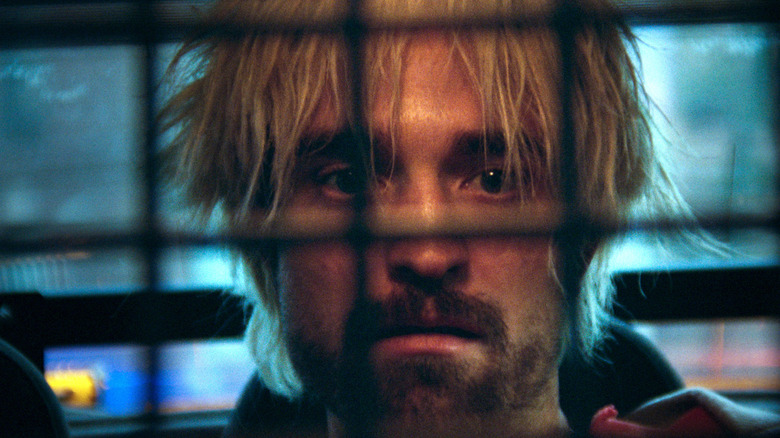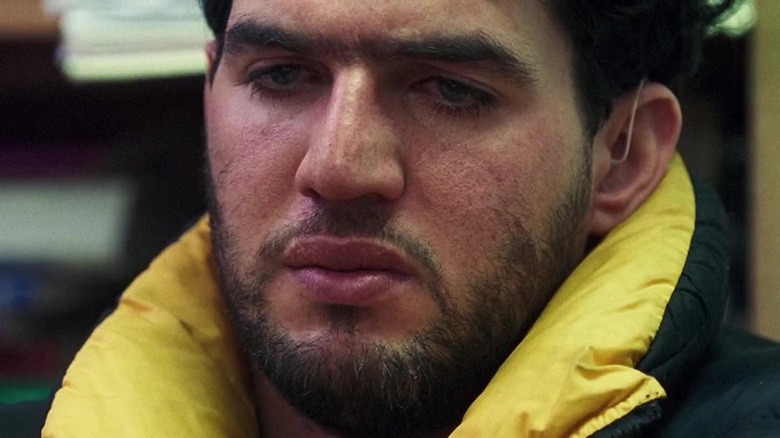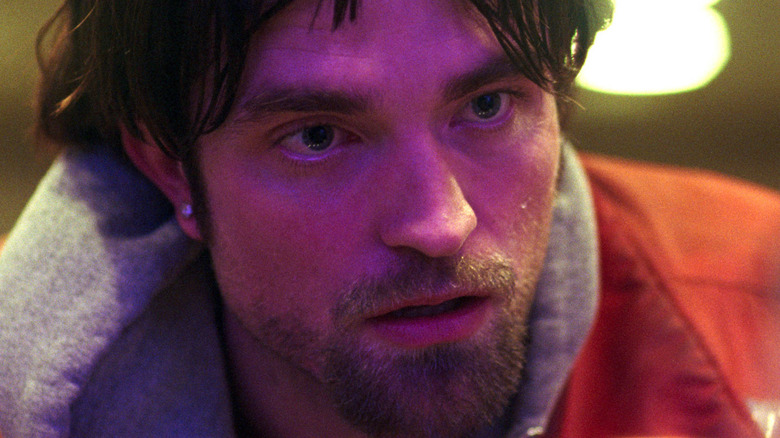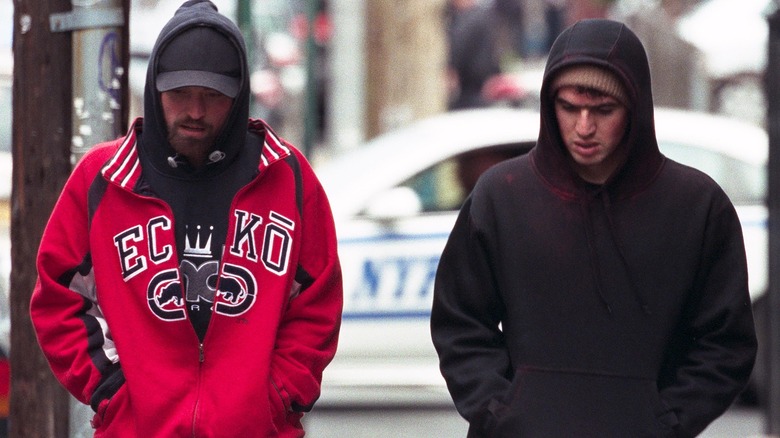Josh Safdie Was Relentless When It Came To Writing Good Time
It is officially out of vogue to hold the "Twilight" movies against either Krysten Stewart or Robert Pattinson.
In the years since their first major appearances in the industry with the vampire blockbuster, both actors have gone on to reestablish themselves as two of the most compelling and must-watch actors around. Pattinson in particular has used his franchise windfall to turn his career toward much more interesting directions. The "Tenet" and "The Batman" actor has starred in all sorts of low-budget indies and repeatedly collaborated with some of the best filmmakers, making original and unique movies. Those names include David Cronenberg's "Cosmopolis" in 2012 (a role that served as some "Batman" fans' assumption of how his version of Bruce Wayne would turn out), David Michôd with 2014's post-apocalyptic, Australia-set "The Rover," Anton Corbijn's "Life," James Gray's "The Lost City of Z," Claire Denis' space psychological thriller/horror movie "High Life," Robert Eggers' black-and-white "The Lighthouse," and David Michôd's "The King" as the wig-wearing and flamboyant Dauphin.
Pattinson has since made his grand return to the blockbuster scene with Christopher Nolan's "Tenet" and, most recently, Matt Reeves' "The Batman," but one particular movie in his filmography continues to stand out in all the best ways.
2017's "Good Time" accomplished a number of things at once, even beyond simply being a great and highly entertaining thriller. In addition to reminding audiences of just what Pattinson is capable of as a performer, the film also brought sibling directors Josh and Benny Safdie into the public eye to stay. Following the misadventures of Connie Nikas (Pattinson) and his mentally ill brother Nick (portrayed marvelously by co-director Benny Safdie) throughout the course of a very long day, the stylish and gorgeously-shot story about a pair of amateur bank robbers immediately earned critical acclaim upon release. Not only does the film get a loving shout-out in "The Batman," but Pattinson's performance as the troubled Connie may have even played a role in landing him the character of Bruce Wayne, too.
'It was harder to write his backstory than to write the script'
Though "Good Time" operates at a grueling, non-stop pace and comes in at a relatively brisk 101 minutes, the writing, background, and prep work that went into the formation of the script was nothing short of intense. The Safdie brothers have spoken at length about just what went into the screenplay and the inspired creation of the characters of Connie and Nick.
Though Pattinson may currently be the talk of the town for his grungy, emo approach to Batman, the famous comic book character comes with an advantage that the filmmakers behind "Good Time" never had. Bruce Wayne has the benefit of decades and decades of source material, allowing storytellers to pick and choose whichever aspects of the hero they'd like to emphasize. With "Good Time," the Safdie brothers (along with integral collaboration with Pattinson himself, of course) had to develop the character's personality, looks, and backstory entirely from scratch. And while much of those additional details never ended up explicitly on-screen, the work that went into the creation of such a fascinating and complicated character sure showed up where it mattered most.
Josh Safdie once revealed in an interview with Independent that he went the extra mile to create an entire fictional biography for Connie, as much to help Pattinson with his performance as it was meant for the Safdies themselves. As he put it at the time:
"We really had to have the history, to create the illusion they were street-cast. I often mention it was harder to write his backstory than to write the script. The script was actions, but writing this biography was so involved. When I look at Connie, I look at his childhood, which no one who watches the movie knows, but maybe through osmosis you feel it."
'He was very involved within the development aspect'
Pattinson, for his part, played just as important a role in bringing the character to life. The report indicates that Pattinson was "fully involved with the development," working right alongside the directing duo while preparing for the movie. To Josh Safdie, all this was meant to create a "lived-in" world, an achievement that he considers:
"...the best description a film can achieve, because you want the movie to have existed before you see it."
This is a common refrain among both moviemakers and intuitive audiences alike, for good reason. A key aspect of world-building revolves around the notion that characters and their settings are so fully-realized and fleshed-out, that it almost feels as if viewers were merely dropping into a day in the lives of these fictional individuals.
Meanwhile, few would likely believe that the sparkly romantic lead of the angsty, young adult-oriented "Twilight" movies would ultimately go on to express such a deep and abiding love of storytelling and character as much as Robert Pattinson has. As it turns out, the Safdie brothers discovered this very aspect through their work with the actor on "Good Time." In a separate interview with Vanyaland, both Josh and Benny Safdie couldn't possibly speak more highly of Pattinson or in more glowing terms. According to Josh:
"So I wrote a very extensive character background that started when his character was born and ended when he enters the movie. And he was involved with that, not necessarily writing or bringing specific things [to the background], but he'd question these landmarks in his life in a very particular way that would force me to go even deeper into that digression, and then weirdly, it'd become really helpful when we'd get to the fork in the road of the movie and we'd need to know exactly what this guy would do or say because we'd developed exactly who he was. So he was very involved within the development aspect."
'He's not entering as Rob Pattinson, he's entering as Connie Nikas'
Co-director and co-writer Josh Safdie goes on to describe how, at the time, he would send entire drafts of the movie to Pattinson while he was filming on "Lost City of Z," sometimes radically changing the script in a matter of weeks and constantly seeking input from the busy actor. Benny echoes these thoughts as well:
"He came to New York and we did camera tests and character history-building, between him and I for the brother. We wrote letters — Josh had him write a letter to me from jail, and then I would respond in kind as Nick. And so, just having this ability to build this character kind of from the ground up really allowed it just to be real. You feel all that texture in everything, in the sense that when he enters the movie, he's not entering as Rob Pattinson, he's entering as Connie Nikas. And that's something special."
Even more so than the practice of "method acting," this act of going the extra mile to really help develop such a complex, living and breathing character — even for specific aspects of his backstory that wouldn't necessarily translate to the actual movie once fully filmed — likely helps audiences connect with the personalities and flaws and mindsets of the fictional individuals they watch on the big screen.
Perhaps this freedom of collaboration helps explain Pattinson's unique and surprisingly bold career path. Whatever the case, we simply can't wait to see more.



